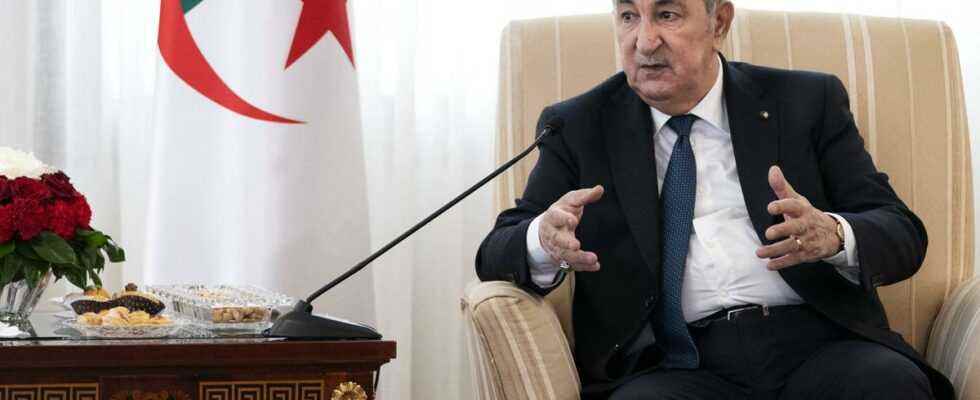Abdelmadjid Tebboune made this proposal during an interview with historian Benjamin Stora, who had submitted a report, however, very criticized in Algeria on the memory of colonization in the country to Emmanuel Macron in 2021.
Algerian President Abdelmadjid Tebboune has proposed a “memory work” common throughout the period of French colonization in Algeria, during an interview with the French historian Benjamin Stora, the latter told AFP. The interview was all the more unprecedented as Benjamin Stora’s report on the memory of colonization and the Algerian war, submitted in January 2021 to Emmanuel Macron, had been freshly received in Algeria.
The historian, who was carrying a letter from the French president, was received for more than an hour Monday in Algiers by President Tebboune, on the eve of the commemoration with great fanfare of the 60th anniversary of the independence of Algeria. “It is the first time that there was a discussion on the merits” Algerian side on these memorial issues since the publication of the report, underlined Benjamin Stora.
The report, on which Emmanuel Macron relied for his memorial policy, does not advocate apologies or repentance, which has been widely criticized in Algeria, in particular by veterans’ associations.
SEE ALSO – 60 years after her departure from Algeria, this pied-noir recognizes herself in one of the Figaro
Read also“We, daughters and wives of harkis, reject the Stora report on the Algerian war”
Franco-Algerian relations also experienced a big chill when in September 2021, President Macron criticized the system “politico-military” Algerian to maintain a “memorial rent” around the War of Independence.
“Murderous Conquest”
The interview bears witness to the ongoing warming in Franco-Algerian relations over the past few weeks. “I think there is a will, to relaunch I don’t know if that’s the word, but to continue a dialogue”believes Benjamin Stora, noting a “change of tone” between Paris and Algiers.
President Tebboune explained to him “the major importance of a work of memory over the entire period of colonization”beyond the Algerian war alone (1954-1962), an opinion shared by the historian.
“The war of conquest was very long and very deadly. It lasted almost half a century., from 1830 to 1871, recalls Benjamin Stora. She was marked by a “land and identity dispossession” – “when people lost their land, they lost their name” – and by setting up a “settlement colony”with in the end one million Europeans out of nine million inhabitants.
Read alsoReport on colonization and the war in Algeria: Benjamin Stora, a historian between two shores
So many traumas which persist until today in the reciprocal perception of the two peoples and which “explain the difficulty of Franco-Algerian relations”he said. “People don’t know what happened. This is the problem of transmission to younger generations and working together.emphasizes Benjamin Stora.
“Polarization on 1962”
“In Algeria, the emphasis was essentially on the war of national liberation. There was in France as in Algeria an extreme polarization on the only sequence of the war and even of the end of the war, the years 1960 to 1962 “, he notes. With the backdrop of “memory group clashes” around the different massacres, the exodus of the black feet, the power struggles within Algerian nationalism.
“We all focused on 1962”, from the Evian agreements in March to the independence of Algeria on July 5, he says. But “we cannot remain prisoner of a single date, 1962, we must broaden the field of reflection”he considers.
President Tebboune did not return during the interview to the controversial remarks of Emmanuel Macron, who also wondered about the existence of a “Algerian nation” before French colonization. The memorial subject could be the subject of future exchanges between the two Heads of State.
In the missive delivered by Benjamin Stora, the French president calls on the “strengthening already strong ties” between the two countries and reiterates its “commitment to continue its process of recognition of the truth and reconciliation of memories“. He also mentions a “next” visit to Algeria.
SEE ALSO – First World War: London apologizes for not commemorating the victims of the colonies
